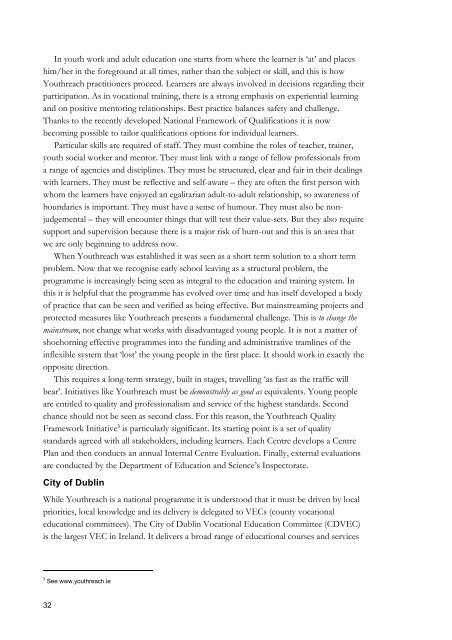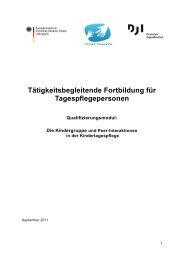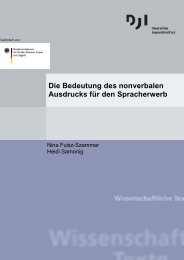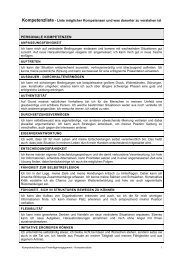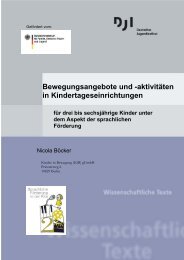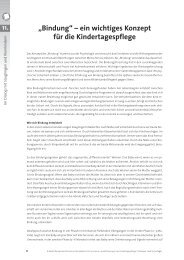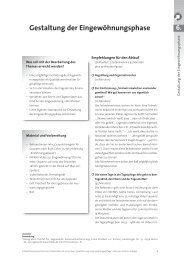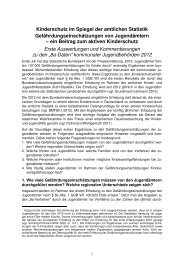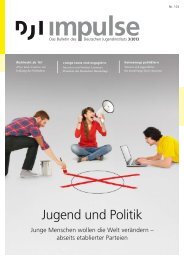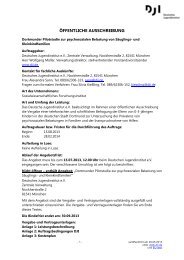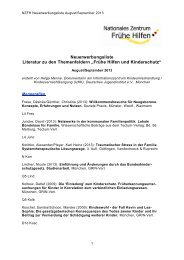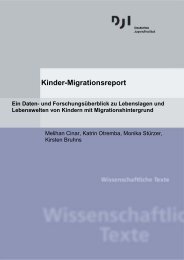download - Deutsches Jugendinstitut e.V.
download - Deutsches Jugendinstitut e.V.
download - Deutsches Jugendinstitut e.V.
Create successful ePaper yourself
Turn your PDF publications into a flip-book with our unique Google optimized e-Paper software.
In youth work and adult education one starts from where the learner is ‘at’ and places<br />
him/her in the foreground at all times, rather than the subject or skill, and this is how<br />
Youthreach practitioners proceed. Learners are always involved in decisions regarding their<br />
participation. As in vocational training, there is a strong emphasis on experiential learning<br />
and on positive mentoring relationships. Best practice balances safety and challenge.<br />
Thanks to the recently developed National Framework of Qualifications it is now<br />
becoming possible to tailor qualifications options for individual learners.<br />
Particular skills are required of staff. They must combine the roles of teacher, trainer,<br />
youth social worker and mentor. They must link with a range of fellow professionals from<br />
a range of agencies and disciplines. They must be structured, clear and fair in their dealings<br />
with learners. They must be reflective and self-aware – they are often the first person with<br />
whom the learners have enjoyed an egalitarian adult-to-adult relationship, so awareness of<br />
boundaries is important. They must have a sense of humour. They must also be nonjudgemental<br />
– they will encounter things that will test their value-sets. But they also require<br />
support and supervision because there is a major risk of burn-out and this is an area that<br />
we are only beginning to address now.<br />
When Youthreach was established it was seen as a short term solution to a short term<br />
problem. Now that we recognise early school leaving as a structural problem, the<br />
programme is increasingly being seen as integral to the education and training system. In<br />
this it is helpful that the programme has evolved over time and has itself developed a body<br />
of practice that can be seen and verified as being effective. But mainstreaming projects and<br />
protected measures like Youthreach presents a fundamental challenge. This is to change the<br />
mainstream, not change what works with disadvantaged young people. It is not a matter of<br />
shoehorning effective programmes into the funding and administrative tramlines of the<br />
inflexible system that ‘lost’ the young people in the first place. It should work in exactly the<br />
opposite direction.<br />
This requires a long-term strategy, built in stages, travelling ‘as fast as the traffic will<br />
bear’. Initiatives like Youthreach must be demonstrably as good as equivalents. Young people<br />
are entitled to quality and professionalism and service of the highest standards. Second<br />
chance should not be seen as second class. For this reason, the Youthreach Quality<br />
Framework Initiative 3 is particularly significant. Its starting point is a set of quality<br />
standards agreed with all stakeholders, including learners. Each Centre develops a Centre<br />
Plan and then conducts an annual Internal Centre Evaluation. Finally, external evaluations<br />
are conducted by the Department of Education and Science’s Inspectorate.<br />
City of Dublin<br />
While Youthreach is a national programme it is understood that it must be driven by local<br />
priorities, local knowledge and its delivery is delegated to VECs (county vocational<br />
educational committees). The City of Dublin Vocational Education Committee (CDVEC)<br />
is the largest VEC in Ireland. It delivers a broad range of educational courses and services<br />
3<br />
See www.youthreach.ie<br />
32


